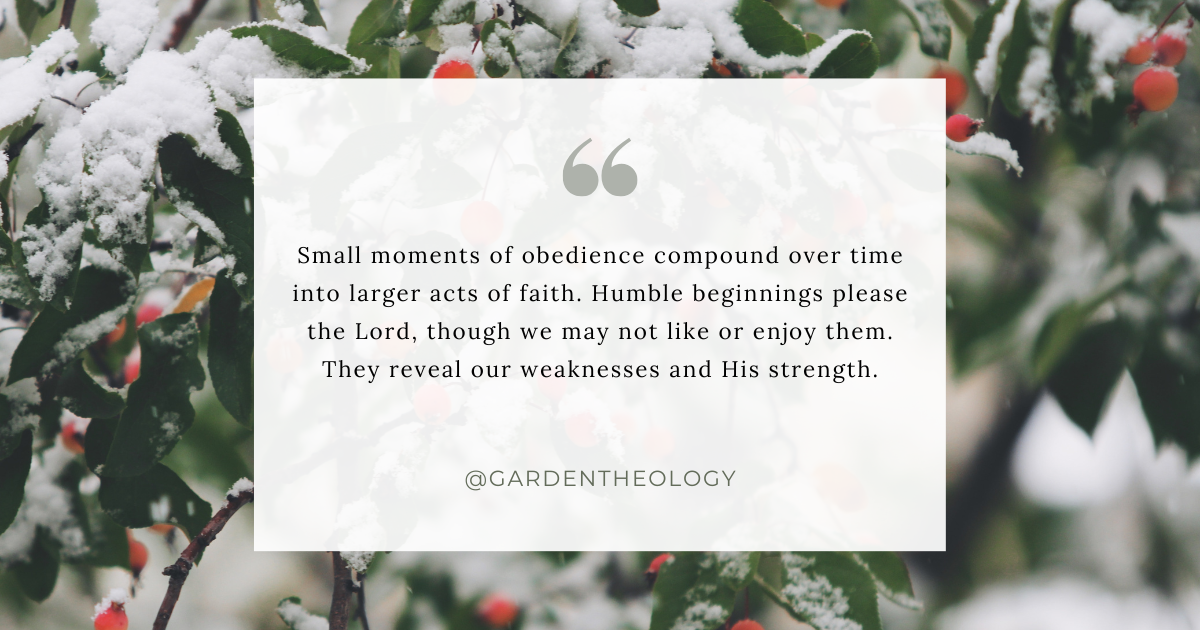On Humble Beginnings and Launching Something New
A new year always means a fresh start, a fresh look at who we are and who we want to be. Sometimes it can be exciting and other years it can be daunting. Here at Garden Theology, we have been both expectant and nervous to get things going!
We’re in the process of recording podcasts, writing devotionals, collecting Biblical truths for the Herbarium, and launching a new literary journal focused on prayers, psalms, and hymns. To say things are busy would be an understatement!
This week, we started recording the Garden Theology podcast, called ROOTED. While we felt like God was calling us to start a podcast, we really lacked the resources, time, and knowledge to do so. And as we sat down with a table full of microphones, XLR cords, and audio interfaces—we just began to laugh.
It was both absurd and deeply moving. We really had to just pray that God would help us figure out what to do or send someone with more experience to assist us. Beyond recording, editing, and publishing—there is so much work that goes into every creative endeavor. So much pressure—but also promise, when it’s something God has asked for you to do.
While being obedient, and looking rather silly doing it, the Lord brought me to Zechariah 4:10: Do not despise these small beginnings, for the Lord rejoices to see the work begin.
By My Spirit, Says the Lord
The book of Zechariah details visions and prophecies from God about the coming of Christ. Zechariah was tasked by God to encourage the people to rebuild the temple (both the physical temple and a spiritual one), knowing that the Messiah would one day dwell in it. Zechariah encourages his readers that the Lord remembers His promises and He is faithful to fulfill what He has spoken. Zechariah means “the LORD remembers,” which is demonstrated throughout the prophetic visions and messages.
Zechariah was specifically encouraging Zerubbabel, the civic leader who was in charge of rebuilding the temple. It was no easy task. Some backstory, when Solomon built the temple, he had 150,000 men, 3,000 superintendents, and unlimited funding. After the template was plundered, all that was left were large, unmovable stones. No one thought they could rebuild the temple. No one had the resources of Solomon. But God asked anyways.
“This is what the Lord says to Zerubbabel: It is not by force nor by strength, but by my Spirit, says the Lord of Heaven’s Armies. Nothing, not even a mighty mountain, will stand in Zerubbabel’s way; it will become a level plain before him! And when Zerubbabel sets the final stone of the Temple in place, the people will shout: ‘May God bless it! May God bless it!’ Then another message came to me from the Lord: “Zerubbabel is the one who laid the foundation of this Temple, and he will complete it. Then you will know that the Lord of Heaven’s Armies has sent me. Do not despise these small beginnings, for the Lord rejoices to see the work begin, to see the plumb line in Zerubbabel’s hand.’ (The seven lamps represent the eyes of the Lord that search all around the world.)”
A few moments in Zechariah 4 really stand out—and also encourage me.
It is not by force nor by strength, but by my Spirit, says the Lord of Heaven’s Armies.
Firstly, the Spirit of the Lord is what accomplishes the work of the Lord. No amount of striving, might, ability, or strength is going to fulfill the calling the Lord has placed on your life. It is through our weakness, God makes us strong. His power is made perfect in our weakness (2 Corinthians 12:9).
Nothing, not even a mighty mountain, will stand in Zerubbabel’s way; it will become a level plain before him!
God is strong enough to cast down mountains that stand in our way. It doesn’t mean that there won’t be obstacles. God actually lets us know that there will be troubles but that He has already overcome them (John 16:33). God wants to be our provision and strength in the face of hardships.
Zerubbabel is the one who laid the foundation of this Temple, and he will complete it.
God desires for us to finish what we start. He wants us to rely on Him and not our own abilities. He wants to provide for us, not just to begin, but to finish the work He has called us to. God is faithful to complete His work (Philippians 1:6).
Do not despise these small beginnings, for the Lord rejoices to see the work begin, to see the plumb line in Zerubbabel’s hand.
We were made to do the Lord’s work, and He likes to watch us do it. No matter the tool in our hand, whether a stone or a measure, God is happy when we choose to be obedient to His calling for our life. We should not be embarrassed by how little we have compared to the task at hand. Everyone has to start somewhere—and how much better it is to start with the Lord!
(Your version might mention the plumb line of Zerubbabel. A plumb line is a simple tool—a weight hanging by a cord. A builder could use it to make sure the structure was vertically aligned, kind of like a level we would use to hang pictures. Amos 7 details more about how God uses a plumb line to see if His people are walking straight.)
Small moments of obedience compound over time into larger acts of faith. Humble beginnings please the Lord, though we may not like or enjoy them.
What Tool Is In Your Hand?
Today, everyone wants a platform. Everyone wants someone else to do the work for them, to labor on their behalf. Everyone wants the easy way out. (I’m talking about myself here, too. I just overpaid someone to install new smoke detectors in my house because I didn’t want to climb a ladder and do it myself.)
But God has a different way. He doesn’t need you to have a following to lead. He doesn’t need you to have money to launch a project. He isn’t worried about your lack of knowledge. He just wants you to start.
You don’t need a doctorate in theology to speak the Truth of God. You don’t need to be a social media star to influence how people see God. You don’t need to be rich to be generous.
We all desire the end product before the small beginning. But God is inviting us into humbleness with Him. So He can get the glory.
What tools are in your hand?
Are you working with the tools God gave you? Or are you distracted by your phone, your money, your striving? Today, you have a choice to set down whatever you are holding onto and pick up the tools of the Spirit—love, joy, peace, forbearance, kindness, goodness, faithfulness, gentleness, and self-control. (Galations 5: 22-23).
The raise you need to afford the move God is calling you to? He will provide.
The support you need to launch your new ministry? He will provide.
The equipment you need to get started? He’s already sent it in the mail.
Make room for God to show up and watch Him work. He loves to delight in His children.
“Humble yourselves before the Lord, and he will lift you up.”
ELISE LAKEY
Elise is a writer, artist, and photographer based out of Nashville, TN. She’s the founder of Garden Theology and seeks to help all gardeners-in-training come to their full purpose in God. When she’s not writing, you can find her playing in the dirt, snuggling her cats, or weaving tapestries.


